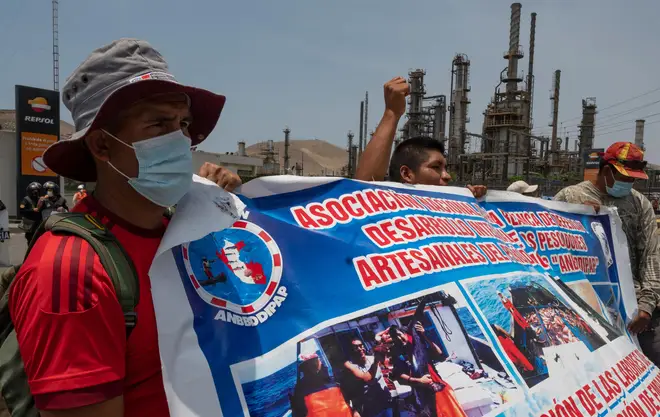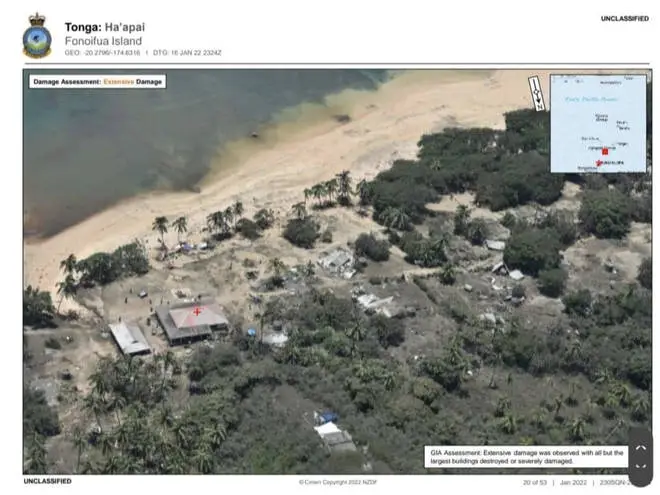
Simon Marks 3pm - 7pm
19 January 2022, 22:44

Peruvian fisherman have staged protests after a tsunami caused by a volcanic eruption in Tonga has caused an oil spill on the coast of the South American country.
The men gathered outside the country's main oil refinery La Pampilla in the province of Callao, near Lima, to demand to speak with company representatives.
"There is a massacre of all the hydrobiological biodiversity," said Roberto Espinoza, leader of the local fishermen.
"In the midst of a pandemic, having the sea that feeds us, for not having a contingency plan, they have just destroyed a base of biodiversity."
Read more: Brit tsunami victim died on Tongan beach trying to save her dogs, brother reveals
Read more: Tonga tsunami: 3 confirmed dead as leaked military photos show 'catasrophic' damage
Under the eyes of police, the fishermen carried a large Peruvian flag, fishing nets and signs that read "no to ecological crime", "economically affected families" and "Repsol killer of marine fauna".

Tsunami alert after Tonga volcano erupts
The oil spill was caused by waves from an eruption of an undersea volcano in the South Pacific nation of Tonga, more than 6,000 miles away from the Peruvian coast.
An Italian-flagged ship was loading oil into La Pampilla on Saturday when strong waves moved the boat and caused the spill.
Peru's environment minister, Ruben Ramirez, told reporters that authorities estimate 6,000 barrels of oil were spilled in the area, which is rich in marine biodiversity.
Read more: Tonga: Rush to safety after undersea volcano eruption triggers tsunami warning
Read more: Tsunami warning issued for USA after underwater volcano erupts in Tonga
The refinery is managed by Spanish company Repsol and processes around 117,000 oil barrels a day, according to its website.
No company executives approached the protesters and the company did not immediately return an email from The Associated Press seeking comment.
Repsol said on Sunday said the spill occurred "due to the violence of the waves".

The eruption caused waves that crossed the Pacific.
In Peru, two people drowned off a beach and there were reports of minor damage from New Zealand to Santa Cruz, California.
On Tuesday, north-west of the facility, on Cavero beach, the waves covered the sand with a shiny black liquid, with many small dead crustaceans apparent.
Fifty workers from companies that work for Repsol inside the refinery removed the oil-stained sand with shovels and piled it up on a small promontory.
Read more: Urgent warning for dog owners after 'hundreds' of pups fall sick with mystery illness
Read more: Wetherspoon boss Tim Martin blasts No10 'hypocrisy' saying pubs should have been open
Juan Carlos Riveros, biologist and scientific director in Peru of Oceana - an organisation dedicated to protecting the world's oceans - said that the species most affected by the spill included guano birds, seagulls, terns, sea lions and dolphins.
"The spill also affects the main source of work for artisanal fishermen, since access to their traditional fishing areas is restricted or the target species become contaminated or die," Mr Riveros said.
"In the short term, mistrust is generated about the quality and the consumption of fishing is discouraged, with which prices fall and income is reduced."
Peru's environmental assessment and enforcement agency estimates that some 18,000 square metres of beach on Peru's Pacific coast have been affected by the spill.
In a statement, the Peruvian agency said Repsol "has not adopted immediate measures in order to prevent cumulative or more serious damage that affects the soil, water, flora, fauna and hydrobiological resources".
On Monday, an AP reporter observed workers dressed in white suits collecting the spilled oil with plastic bottles cut in half.
Jose Llacuachaqui, another local fisherman leader, who was watching the clean-up, said the workers were collecting the oil that had reached the sand, but not the crude that was in the seawater.
"That is preying, killing, all the eggs, all the marine species," he said.